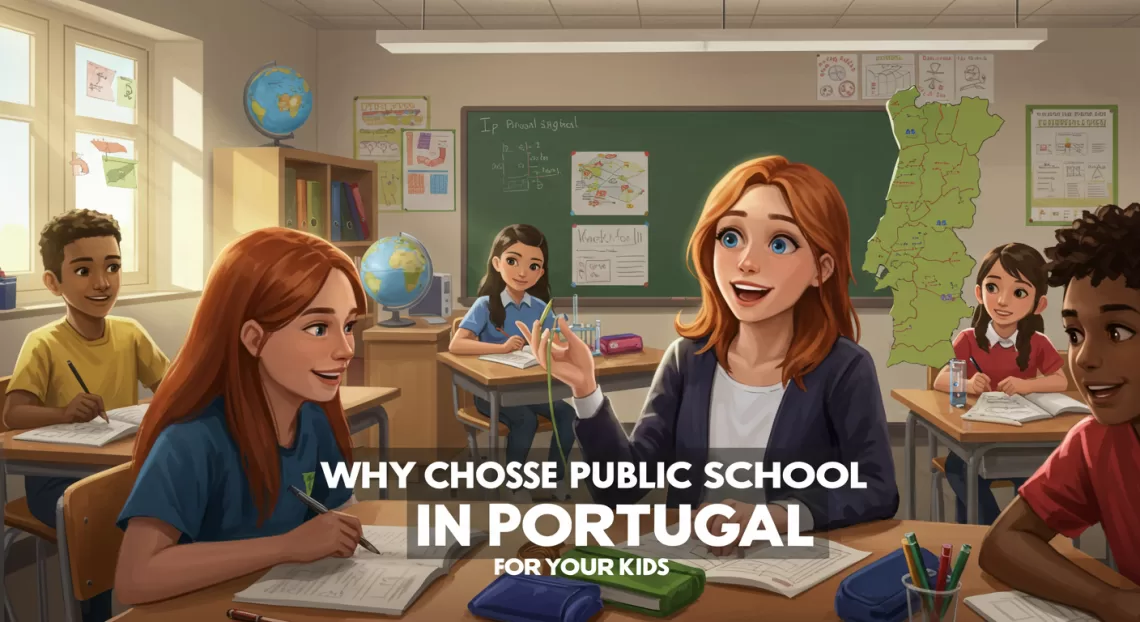
Enrolling in a Portuguese Public School: A Guide
How to Enroll in Portuguese Public School: A Simple Guide for Expats 🎒🇵🇹
Moving to a new country like Portugal is an exciting adventure! You’re probably looking forward to sunny days, delicious food, and a vibrant culture. But if you have children, one big question often comes to mind: “What about school?” Finding the right education for your kids is a top priority, and Portugal’s public school system offers a fantastic option for many expat families.
This guide is here to help you understand how to enroll your child in a Portuguese public school. We’ll break down the steps, documents, and important things you need to know to make the process as smooth as possible. Get ready to embark on this important journey for your family!
Key Takeaways
- Gather Essential Documents: You’ll need documents like your child’s passport, your residence permit, proof of address, and vaccination records.
- Understand the Local System: Portuguese public schools are managed by local councils (Junta de Freguesia) and school clusters (Agrupamento de Escolas).
- Apply Online or In-Person: The main application period is usually between April and June, often done through the Portal das Matrículas online.
- Language is Key: Portuguese is the language of instruction. Schools often provide support for non-native speakers, but embracing the language will help your child integrate.
- Be Patient and Prepared: The process can take time, so start early and be ready for some paperwork.
Why Choose Public School in Portugal?
When you’re settling into a new country, deciding on your child’s education is a big deal. Many expat families in Portugal choose public schools for several great reasons:
- Free Tuition: Yes, you read that right! Public schools in Portugal generally offer free tuition from pre-school (kindergarten) all the way through secondary school. This can save families a lot of money compared to private or international schools. While tuition is free, you might pay for things like school meals, books, and supplies, but these costs are often much lower than private school fees.
- Cultural Immersion: Enrolling your child in a public Portuguese school is one of the best ways for them to truly experience and become part of Portuguese culture. They’ll make local friends, learn about traditions, and understand the daily life of Portuguese children. It’s a fantastic way to integrate into your new community!
- Language Learning: Your child will be immersed in the Portuguese language every day. This is an incredibly effective way for them to become fluent, which is a huge asset for living in Portugal and for their future. Many schools offer special support for students learning Portuguese as a second language (PLNM – Português Língua Não Materna).
- Quality Education: Portugal has a well-regarded education system. Public schools provide a solid curriculum that prepares students for higher education and future careers. Teachers are qualified, and the schools aim to provide a nurturing and challenging environment.
- Community Connection: Public schools are often at the heart of local communities. By sending your child to a local school, you’ll naturally connect with other parents and families, helping you build a support network and feel more at home.
Choosing a public school is a step towards a deeper, more integrated experience in Portugal for your whole family. It’s an investment in your child’s language skills, cultural understanding, and overall journey as a global citizen.
Understanding the Portuguese Education System
Before you enroll your child, it’s helpful to know how the Portuguese education system works. It’s structured into different levels based on age, similar to many other countries.
Here’s a quick overview:
- Educação Pré-Escolar (Pre-school/Kindergarten):
- Ages: Typically for children aged 3 to 5 years old.
- Focus: This stage is not compulsory but is highly recommended. It focuses on developing social skills, creativity, and preparing children for basic education through play and structured activities.
- Availability: Public pre-schools are part of the state system, but spaces can sometimes be limited, especially in popular areas.
- Ensino Básico (Basic Education):
- This is the compulsory stage of education in Portugal, lasting for nine years. It’s divided into three cycles:
- 1º Ciclo (1st Cycle):
- Ages: 6 to 9 years old (Grades 1-4).
- Focus: Core subjects like Portuguese, Math, Environmental Studies, and Artistic Expression. Children typically have one main teacher for most subjects.
- 2º Ciclo (2nd Cycle):
- Ages: 10 to 11 years old (Grades 5-6).
- Focus: Students begin to have different teachers for different subjects, like Portuguese, Math, History, Geography, and a foreign language (usually English).
- 3º Ciclo (3rd Cycle):
- Ages: 12 to 14 years old (Grades 7-9).
- Focus: More specialized subjects are introduced, including Sciences (Physics, Chemistry, Biology), more foreign languages, and technology. This cycle ends with national exams in certain subjects.
- Ensino Secundário (Secondary Education):
- Ages: 15 to 17 years old (Grades 10-12).
- Focus: This stage prepares students for higher education or professional life. Students choose different study paths (e.g., Sciences and Technologies, Social and Human Sciences, Visual Arts, Professional Courses) depending on their interests and future goals. This cycle also ends with national exams, which are crucial for university applications.
Important Note: The Portuguese school year typically runs from mid-September to late June. Holidays include Christmas, Carnival, Easter, and a long summer break.
Knowing these stages will help you understand where your child fits in and what to expect from their education journey in Portugal.
“Education is the most powerful weapon which you can use to change the world.”
— Nelson Mandela
Eligibility and Requirements for Expats
To enroll your child in a Portuguese public school, there are a few key things you and your child will need. Think of these as the main “tickets” to get into the system.
- Residency Status:
- Your family must be legally living in Portugal. This means you should have a residence permit (Autorização de Residência) or be in the process of obtaining one. The school will need proof that your child is a legal resident.
- If you’re just starting your move, check out our comprehensive guide to moving to Portugal for details on visas and immigration processes.
- Child’s Age:
- Your child’s age will determine which cycle of education they enroll in. Children typically start 1st grade (1º Ciclo) at age 6.
- For children enrolling in higher grades, their previous academic records will be important to determine their equivalent grade level in Portugal.
- Tax Identification Number (NIF):
- Both you (the parent/guardian) and your child will need a NIF (Número de Identificação Fiscal). This is your Portuguese tax number, essential for almost everything in Portugal, including school enrollment.
- You can get a NIF from a Finanças (tax office) or through a legal representative.
- Social Security Number (NISS):
- The parents/guardians should have a NISS (Número de Identificação da Segurança Social). This is your social security number. It’s usually required for official processes and can be obtained from the Social Security office.
- Health Records/Vaccination Book:
- Your child must have an up-to-date Boletim de Vacinas (Vaccination Book). This shows that your child has received all the necessary vaccinations according to Portuguese public health standards.
- If your child’s vaccination records are from another country, you’ll need to have them translated and verified by a Portuguese health center (Centro de Saúde). They might provide a Portuguese vaccination book or update the existing one.
Meeting these requirements is crucial for a smooth enrollment process. Make sure you start gathering these documents as soon as possible after arriving in Portugal!
Essential Documents You’ll Need
Getting your documents in order is perhaps the most important step in enrolling your child in a Portuguese public school. It can feel like a lot of paperwork, but having everything ready will save you time and stress.
Here’s a detailed list of what you’ll likely need:
- Child’s Identification:
- Passport or Birth Certificate: A copy of your child’s passport (or national ID card if they have one) is essential. If your child doesn’t have a passport, their birth certificate will be needed.
- Visa/Residence Permit: Proof of your child’s legal residency in Portugal, such as a copy of their residence permit (Autorização de Residência).
- Parent/Guardian Identification:
- Passport or ID Card: A copy of the passport or national ID card of the parent(s) or legal guardian(s) enrolling the child.
- Visa/Residence Permit: Proof of your legal residency status in Portugal.
- Proof of Address (Comprovativo de Morada):
- This is very important as schools are assigned based on your residential area (catchment zone).
- Atestado de Residência: This is an official certificate of residency issued by your local parish council (Junta de Freguesia). This is the preferred document.
- Utility Bill: Sometimes, a recent utility bill (electricity, water, gas, internet) in your name, showing your Portuguese address, can also be accepted.
- Rental Contract: A copy of your rental agreement (Contrato de Arrendamento) for your Portuguese home.
- Declaration of Honor (Declaração de Honra): If you are very new and don’t yet have an Atestado de Residência, you might be able to provide a signed declaration stating your address, but this usually needs to be accompanied by other proof.
- Tax Identification Number (NIF):
- NIF for the Child: A copy of your child’s NIF document.
- NIF for Parents/Guardians: Copies of your own NIF documents.
- You can obtain NIFs at a local Finanças (tax office).
- Social Security Number (NISS):
- NISS for Parents/Guardians: A copy of your NISS document.
- This is usually obtained from a Segurança Social (Social Security) office.
- Health Records:
- Boletim de Vacinas (Vaccination Book): Your child’s official vaccination record, showing all required immunizations are up-to-date. If these are from your home country, they should be translated into Portuguese and verified by a local Centro de Saúde (health center).
- Previous School Records (if applicable):
- Transcripts/Report Cards: If your child is enrolling in Basic or Secondary Education (grades 2 and up), you’ll need records from their previous school. These should show the grades achieved and the subjects studied.
- Curriculum/Program Details: Sometimes, the school might ask for a brief description of the curriculum from the previous school to help place your child in the correct grade level.
- Translation: All foreign documents, especially school records, should be translated into Portuguese by a certified translator.
- Other Documents (as requested):
- Proof of Income: In some cases, especially for pre-school or if applying for social support (e.g., school meals, books), you might be asked for proof of your household income.
- Special Needs Documentation: If your child has special educational needs, you’ll need any relevant medical reports, psychological assessments, or educational plans. These should also be translated.
Pro-Tip: Make multiple copies of all documents, and keep the originals safe. It’s also a good idea to have digital copies. Remember that official documents from abroad often need to be translated into Portuguese by a certified translator.
For more resources and guides on living in Portugal, explore Fincou.
The Enrollment Process: Step-by-Step
Enrolling your child in a Portuguese public school involves a few key steps. While it might seem daunting, breaking it down makes it much easier to manage.
Step 1: Gather Your Documents (and Get Them Translated!) 📋
As we discussed, this is your first and most crucial step. Before you do anything else, make sure you have all the necessary identification, residency proof, NIF, NISS, health records, and previous school documents ready.
- Action: Collect everything on the “Essential Documents” list.
- Important: Any documents not originally in Portuguese (like foreign school transcripts or vaccination records) must be translated by a certified translator. This is a non-negotiable requirement.
Step 2: Find Your Local School (Agrupamento de Escolas) 🏫
Portuguese public schools are organized into “Agrupamentos de Escolas” (School Clusters). Each cluster includes several schools, often covering pre-school, basic, and sometimes secondary education within a specific geographical area. Your child will be assigned to a school based on your registered address (your “catchment area”).
- How to find it:
- Junta de Freguesia: Your local parish council (Junta de Freguesia) can tell you which Agrupamento de Escolas serves your address. This is a great first stop for local information.
- Local Education Department: The local education department (often part of the Câmara Municipal or Municipality) can also provide this information.
- Online Search: Search “Agrupamento de Escolas [Your Town/City Name]” online.
- Action: Identify the Agrupamento de Escolas responsible for your residential area.
Step 3: Apply Online or In-Person 💻🚶♀️
The application process usually happens during a specific window each year, primarily for enrollment in the next academic year.
- Application Period: The main enrollment period (matrículas) typically runs from April to June for the following September’s school year. For example, to start school in September 2024, you’d apply between April-June 2024.
- Online Application (Portal das Matrículas):
- This is the preferred and most common method for enrollment. The Portuguese Ministry of Education has an online platform called the “Portal das Matrículas.”
- You’ll need to create an account (often using your NIF and a password, or through a digital key – Chave Móvel Digital).
- You’ll fill out the application form online, upload digital copies of your documents, and select your preferred schools (usually within your catchment area).
- In-Person Application:
- If you cannot use the online portal, or if you are applying outside the main enrollment period (e.g., if you arrive mid-year), you can usually apply directly at the secretariat (secretaria) of the Agrupamento de Escolas that serves your area.
- Bring all your original documents and their copies. School staff can help you fill out the forms.
- Action: Apply during the official period, preferably online via the Portal das Matrículas. If applying late or needing assistance, go to the school cluster’s secretariat.
Step 4: Await Placement ⏳
Once you submit your application, the school authorities will review it. Placement is not always guaranteed at your top choice, especially in popular areas. Schools prioritize students based on:
- Residency: Students living within the school’s catchment area.
- Siblings: Children who already have siblings attending the school.
- Special Needs: Students with documented special educational needs.
- Parents’ Workplace: Sometimes, if parents work near the school.
- Action: Be patient. You will be notified of your child’s placement, usually by email or through the Portal das Matrículas.
Step 5: Confirmation and Registration 🎉
After your child is placed, you’ll receive a confirmation. You might then need to go to the school secretariat to finalize the registration.
- What to expect: This step might involve signing additional forms, confirming details, and getting information about the school’s specific rules, schedules, and activities.
- Action: Attend any required registration meetings or complete further paperwork as instructed by the school.
Step 6: School Orientation and Start ✏️
Before the school year officially begins in September, there’s usually an orientation period.
- Meeting Teachers: You and your child will likely have the opportunity to meet the teachers and see the classroom.
- School Supplies: You’ll receive lists for school supplies, and information about textbooks (which are often provided by the school, though sometimes parents need to purchase them).
- Action: Attend orientation events, prepare school supplies, and get ready for the first day of school!
Remember, the local school secretariat or your Junta de Freguesia are excellent resources if you have questions during any of these steps. Don’t hesitate to ask for help!
Important Considerations for Expat Families
Moving to a new school system in a foreign country comes with unique challenges and exciting opportunities. Here are some key things for expat families to keep in mind:
1. Language Barrier 🗣️
- Portuguese is the Language of Instruction: This is the biggest hurdle for many expat children. All subjects are taught in Portuguese.
- PLNM (Português Língua Não Materna): Many public schools offer support classes for non-native Portuguese speakers. These “Portuguese as a Second Language” programs help children learn the language quickly so they can integrate into regular classes. Ask about PLNM support when you enroll.
- Your Role: Encourage your child to learn Portuguese from day one. Apps, cartoons, and simple conversations at home can make a huge difference. The faster they pick up the language, the easier their school experience will be.
2. Cultural Adjustment 🙏
- New Environment: Your child will be entering a new cultural environment. School routines, classroom dynamics, and social norms might be different from what they’re used to.
- Patience and Support: Be patient with your child as they adjust. Listen to their concerns, celebrate small victories, and provide a supportive home environment.
- Parental Involvement: Attend school meetings, events, and try to connect with other parents. This helps you understand the school culture and build a network.
3. School Supplies & Costs 💰
- Free Tuition, but Not “Free Everything”: While tuition is free, you are typically responsible for:
- School Supplies: Notebooks, pens, pencils, backpacks, etc.
- Textbooks: In some cases, textbooks are provided by the school, but sometimes parents need to purchase them, especially for older grades. There are usually government programs that help with textbook costs for families in need.
- School Meals: Lunch is available at school canteens, and there’s usually a daily fee. Subsidies are often available based on family income.
- Extracurricular Activities: Any optional after-school clubs or activities may have additional costs.
- School Insurance: A small annual fee for school insurance is common.
4. School Calendar 🗓️
- Academic Year: The school year generally runs from mid-September to late June.
- Holidays: There are breaks for Christmas (mid-December to early January), Carnival (a few days in February/March), and Easter (around two weeks). The longest break is the summer holiday from late June to mid-September.
- Be Aware: Familiarize yourself with the school calendar to plan family trips and appointments.
5. Transportation 🚌
- School Buses (Autocarro Escolar): In some areas, especially rural ones, school buses are provided for students living a certain distance from the school. Check with your local Agrupamento de Escolas about eligibility and routes.
- Public Transport/Walking: In urban areas, children often walk, use public transport (buses, metro), or are driven by parents.
6. Special Needs Education 🌟
- Inclusive System: Portugal aims for an inclusive education system. If your child has special educational needs, it’s important to declare this during enrollment and provide all relevant documentation (translated).
- Support Teams: Schools have specialized support teams (Equipas Multidisciplinares de Apoio à Educação Inclusiva – EMAEI) that assess students and develop individualized education plans (Plano Educativo Individualizado – PEI).
- Early Communication: Communicate your child’s needs early in the process to ensure appropriate support is put in place.
Living in Portugal offers a wonderful quality of life. To learn more about life in Portugal and its beautiful regions, explore our article on the vibes of Madeira. If you’re still looking for accommodation, our guide on how to rent a studio in Lisbon might be helpful.
Tips for a Smooth Transition
Enrolling your child in a new school system is a big step, but with a little preparation and a positive attitude, you can make it a smooth experience for everyone.
- Start Early: Don’t wait until the last minute! The enrollment process takes time, especially with document gathering and translations. Start researching and preparing months before you plan for your child to begin school.
- Learn Basic Portuguese: Even if your child will receive PLNM support, learning some basic Portuguese phrases as a family will make daily life easier and show your commitment to integrating. Simple greetings, numbers, and common questions can go a long way.
- Connect with Other Expats: Reach out to expat groups or online forums in Portugal. Other families who have gone through the process can offer invaluable advice, support, and even recommendations.
- Visit the School: If possible, try to visit the school before enrollment or before the first day. A familiarization visit can help ease your child’s anxiety and give you a better feel for the environment.
- Be Patient and Flexible: Things might not always go exactly as planned. Bureaucracy can sometimes be slow, and unexpected requests might pop up. Stay patient, be flexible, and remember that everyone is working towards the same goal: your child’s education.
- Encourage and Celebrate: Be your child’s biggest cheerleader! Acknowledge their efforts in learning a new language, making new friends, and adapting to a new routine. Celebrate every small success.
- Stay Informed: Keep up-to-date with school communications. Schools often use digital platforms or apps for announcements.
- Review Privacy Policies: For details on how your data is handled when using online services related to your move, please review Fincou’s Privacy Policy.
By following these tips, you’ll be well on your way to successfully enrolling your child in a Portuguese public school and setting them up for a rewarding educational journey!
Interactive Portuguese School Enrollment Document Checklist
This interactive checklist will help you keep track of the documents you need for enrolling your child in a Portuguese public school. Simply check off the items you have, and see what’s left!
Document Checklist
Conclusion
Enrolling your child in a Portuguese public school is a fantastic way to immerse your family in the local culture and provide a quality education. While the process requires gathering several documents and understanding the local system, it is entirely manageable. By starting early, staying organized, and being open to the cultural and linguistic adjustments, you can ensure a smooth transition for your child and a rewarding experience for your whole family in Portugal. Welcome to your new adventure!



